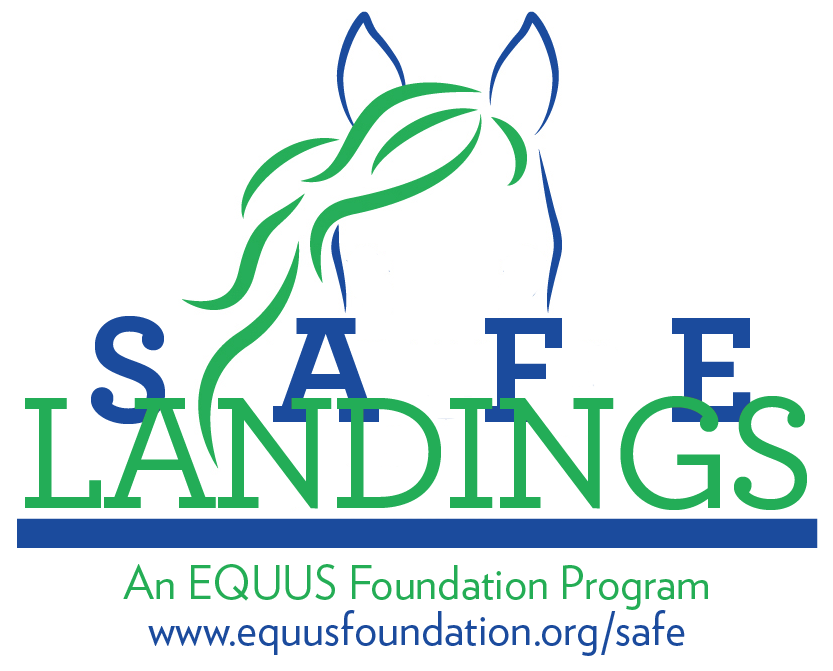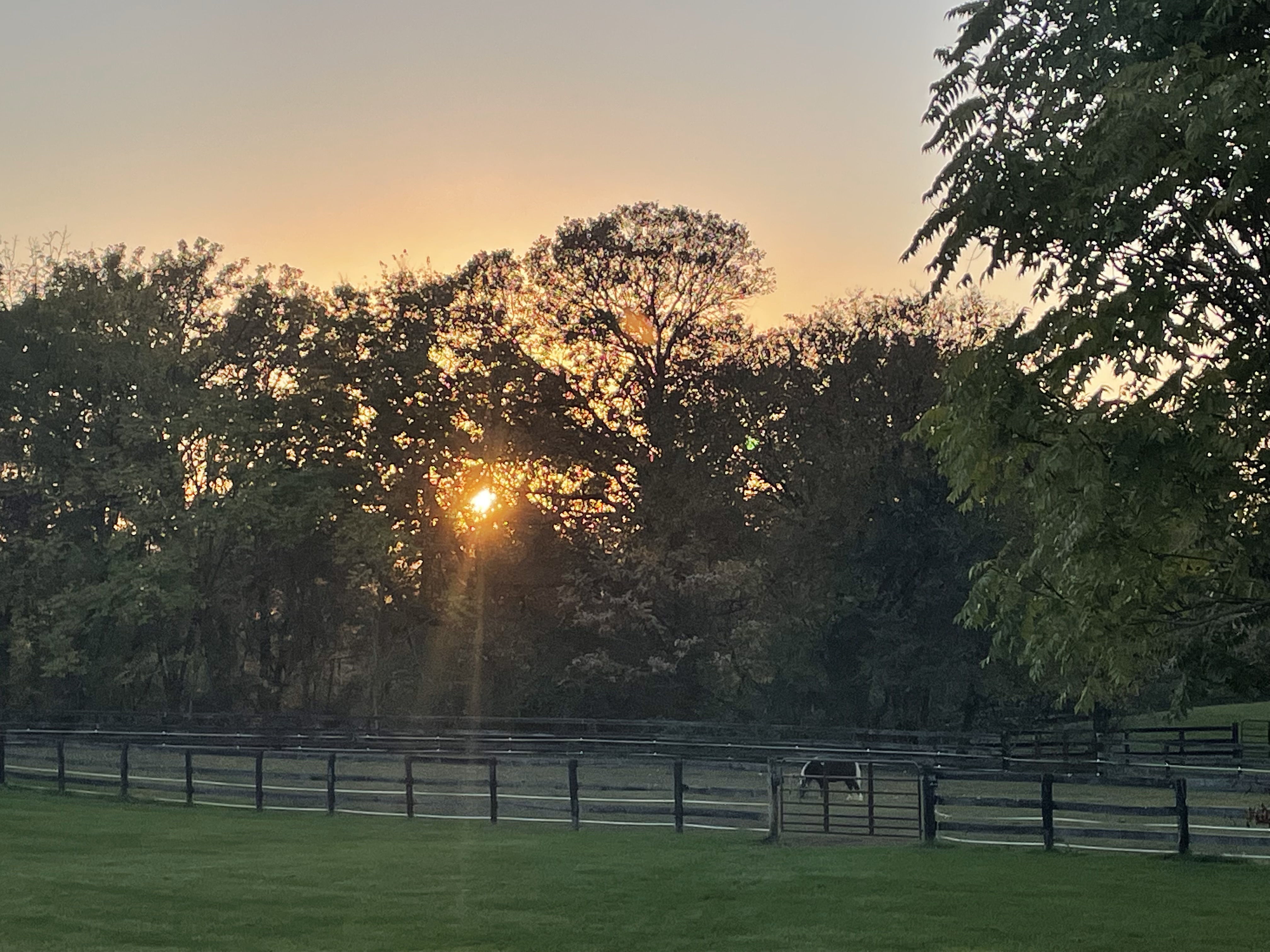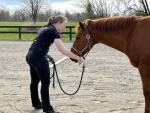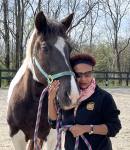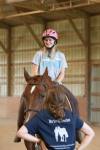Are we the next chapter for your horse?
Seeking draft cross or similar for military riding program
We are seeking a Horse that meets the following criteria:
Age Range:
Aged 6-9 Aged 10-14 Aged 15-20
Gender:
Geldings Mares
Size Preference:
Large Horse (16.0 to 16.3h) Tall/Draft Horse (over 17.0h)
Breeds we will
NOT consider:
We would prefer a non-gaited horse that is suitable for independent adult participants to ride at walk, trot, and canter.
Temperament:
The ideal equine is curious, thoughtful, and intelligent. We seek equines that can provide measured feedback to our participants regarding their balance, focus, and engagement.
Activities that the equine will be expected to perform:
English Walk/Trot
English Walk/Trot/Canter
Horsemanship (grooming, tacking up & handling by individuals with disabilities)
Unmounted activities including handling when at liberty in a round pen or arena
Being lunged with a rider
Being long-lined with a rider
Other Activities:
Program equines also participate in equine-assisted psychotherapy programs for civilian and military survivors of trauma.
Current/former experience/training which could make the equine suitable for your program:
Dressage
Eventing
Hunter
Hunter Seat Equitation
Parade Horse
Other Experience/Training:
Formal training in disciplines such as dressage, eventing, hunters, and equitation are welcome assets for participants learning the finer points of steering, lateral work, and independent riding. However, an equine's kindness and patience also are critical traits. It is essential for us to have equines that can help our participants to build mindfulness, felt safety, and authenticity.
The organization has the following policies about horses who are sound and healthy but have the following chronic conditions that require medication:
Lyme Disease: Accept subject to severity of condition
Cushing's Disease: Accept with financial assistance for medication
Thyroid Disease: Accept
Navicular Disease: Accept with financial assistance for medication
Inflammation: Accept subject to severity of condition
Location: The equine will be located at Bridle Paths, 43247 Spinks Ferry Road, Leesburg, VA 20176
Click on photo to view larger image
Close X
Total acreage dedicated specifically to the horses: 20
The organization has use of the following at this facility:
Structures/Barns: 1 Run-in sheds: 0
Pastures: 1 Paddocks/Pens/Turnout Areas: 12
Uncovered Outdoor Rings: 1 Covered Outdoor Rings: 0
Indoor Rings: 1
Horses have assigned stalls in the structure(s).
Horses are stalled for 9-12 hours per day, on average.
Horse Turn Out Practices:
Equines are out 9 to 15 hours per day
The following describes the pastures at this facility:
All pastures are fenced to prevent escape or injury
Electric fencing is used; electric wires or tape fence are visibly marked
Fencing checks, such as broken or missing planks, loose fence posts, exposed or loose nails, detached wires, etc., are done regularly
Pastures are rotated
The following describes the turnout areas other than pastures at this facility:
All turnout areas are fenced to prevent escape or injury
Electric fencing is used; electric wires or tape fence are visibly marked
Fencing checks, such as broken or missing planks, loose fence posts, exposed or loose nails, detached wires, etc., are done regularly
Horses have access to clean drinking water at all times
Hoof care is provided for each horse: Every 4-8 weeks and when an issue arises
Dental care is provided for each horse: Annually and when an issue arises
Each horse is visually and physically checked by personnel at the facility: Every day or 6 days a week
Close X
The organization requires the following with respect to the health status of the equine prior to acceptance and arrival at the organization:
A current Coggins
Vaccination records that have been administered within the last 12 months
If health records are not available or are out-of-date, the owner is responsible for having vaccinations administered.
If health records are not available or are out-of-date, our veterinarian will administer appropriate vaccinations
The organization has the following policies in place prior to an equine being accepted and/or arriving at the facility:
The owner of a potential equine is interviewed over the phone or in person prior to seeing the equine
The equine is evaluated at its place of residence
The owner completes an application/contract which constitutes the agreement between the owner and our organization
The owner is financially responsible for the shipping of the equine to and from the organization
Equines are on trial for up to 30 days
Equines are on trial up to 60 days
Equines are on trial for 60 or more days
The trial period may be reduced based on the equine's progress
During the trial period, the organization accepts total financial responsibility for the care of the equine, including board, feed, shoeing and any necessary veterinary care
The trial period may be terminated by either the organization or the owner for any reason
The organization assesses equines for following skills and behaviors:
Retrieval from a pasture/paddock
Leading with a halter and lead rope
Temperament, disposition and attitude, such as rated from very calm to very high spirited
Saddling
Bridling
Lunging
Loading onto and unloading off a trailer
Mounting and dismounting
Riding at the walk
Riding at the trot
Riding at the canter
Riding by a beginner and/or unbalanced rider
Tolerance to unusual objects and loud noises
Known vices, i.e., cribbing, biting, kicking, weaving, stall walking, etc
Grooming
Bathing
Tolerance to multiple handlers at the same time
Following arrival at the facility, the following is performed:
Physical examination by a veterinarian upon arrival
Physical examination by trained barn staff
Photographs are taken of each equine upon arrival at the facility and kept with the equine's health records
A Henneke Body Conditioning Score or other body conditioning score is assigned
Physical examination by a farrier
Physical examination by a dentist
Blood work other than Coggins
Fecal test
Vaccinations
De-worming
The equine is confined to a designated and separate area for isolation and quarantine at the facility for a prescribed period of time
Our organization has the following policies and procedures in place pertaining to the ongoing assessment of horses in its care:
The Henneke Body Condition score or other body conditioning score is updated at least annually
Equines at our facility may be treated by an equine chiropractor
Equines at our facility may be treated by an equine acupuncturist
Equines at our facility may be treated by an equine massage therapist
Equines at our facility may be treated by an equine nutritionist
Physical examination by a veterinarian at least annually
Horses provided formal training (groundwork or riding):
As needed; no set schedule
Our organization has the following policies and procedures in place pertaining to the weight-carrying or workload capabilities of horses/equines that are ridden in our care:
Our organization evaluates at least annually and maintains a written record of the weight-carrying and workload limitations for each equine that is ridden
The following variables are considered in determining the weight-carrying and workload limitations for each equine that is ridden:
Equine age, weight, breed, body condition, fitness, balance, health and soundness
Equine conformation to include the top line, length of back, strength and width of loin, bone density (measured by the circumference of the cannon bone just below the knee)
Size, shape, condition and angle of the hooves
Participant weight, height, body proportions, balance, fitness and riding skills as well as behavioral issues and safety concerns
Weight and proper fit of the saddle and other equipment
Terrain and footing in the working environment
Duration and frequency of working sessions, as the frequency with which an equine is subjected to maximum weight carrying and/or workload
Nature and pace of work, repetitive or varied, radius of turns, degree of incline and regularity of footing when equine is subject to maximum weight-carrying capacity
Temperature and/or weather conditions
Seasonal impact on the equines' workload and weight-carrying capabilities and limitations
Additional information about intake, assessment & training policies and practices:
We also obtain information about a prospective equine's behavior in the herd, and we evaluate that behavior at the conclusion of the quarantine period.
We consult an equine nutritionist to evaluate each new equine's current body condition, current diet, and any special health and dietary needs. This individual takes pre- and post-photos of each equine she sees, to evaluate the effects of individualized feeding programs.
We have a relationship with a local saddle fitting professional who donates her services to ensure that each new equine that is involved in mounted activities has a saddle that is fitted appropriately and is comfortable for the equine.
Additionally, our program trainer (a former Advanced level event rider) comes to the barn at least weekly to conduct lessons for program staff, volunteers, and horses. She helps us to develop and implement individualized schooling and conditioning programs for each ridden equine at our facility.
The organization has the following policies related to breeding and stallions:
Our main facility where our organization conducts its programs does NOT breed equines.
Close X
Rehoming
Our organization has the following re-homing (adoption/purchase) policies and procedures in place:
The organization does not re-home equines under any circumstances; our organization retains custody of our equines and ensures care of the equines for their lifetimes.
The organization requires references from the following:
Not applicable or no references required.
Transfer of ownership occurs:
Our organization retains ownership of the equine for its lifetime
has the following policies and procedures related to horses that need to be retired, are no longer able to contribute to the mission of the organization, and/or are no longer manageable:
Equines may remain at our organization for their lifetimes
In the case an equine is unmanageable and demonstrates repeated dangerous behaviors, the equine may be euthanized upon the recommendation of the veterinarian
In the case an equine is unsound and/or unhealthy and cannot be treated to relieve suffering, the equine may be euthanized upon the recommendation of the veterinarian
Additional information about rehoming policies and practices:
Our thorough trial period evaluation, close coordination and relationships with horse donors, availability of both mounted and unmounted programs, and close and collaborative relationship with our program veterinarian, have enabled us to provide appropriate care and activities for program horses without the need to identify third-party retirement homes.
Re-homing Agreement not applicable.
Close X
The organization has the following policies and procedures related to horses that need to be retired, are no longer able to contribute to the mission of the organization, and/or are no longer manageable:
Equines may remain at our organization for their lifetimes
In the case an equine is unmanageable and demonstrates repeated dangerous behaviors, the equine may be euthanized upon the recommendation of the veterinarian
In the case an equine is unsound and/or unhealthy and cannot be treated to relieve suffering, the equine may be euthanized upon the recommendation of the veterinarian
The organization has the following policies related to euthanasia:
Our organization will never have an equine euthanized for space
Our organization will have an equine euthanized upon the recommendation of the veterinarian if the equine is a threat to itself, other equines, or people
Our organization will have an equine euthanized upon the recommendation of the veterinarian after all reasonable treatment options have been explored
Euthanasia is done on site when possible to decrease trauma from transport
Disposal of the carcass is handled within 24 hours
The following are authorized to administer the procedure for the organization in accordance with state laws:
Veterinarian
Additional information about the euthanasia policies and practices:
A decision to euthanize a program equine is never taken lightly, and is made only after extensive consultations with the equine's care team (veterinarian, chiropractor, farrier) and owner/lessor, if applicable. Our priority in each case is to ensure that each equine can participate comfortably and happily in the program, supported by the best of medical care and prudent equine management.
When it is determined that this is no longer the case (as happened with longtime program equine Ty, who was euthanized in December 2021 pursuant to increasing struggles with arthritis, navicular syndrome, and other physical challenges), we notified program participants and volunteers to allow time for grieving and goodbyes. We scheduled his euthanasia at a time when his owner and key program staff and volunteers were able to be there, and we arranged for removal of his body for burial promptly after euthanasia.
During 2022, we sadly had to euthanize two of our longtime herd members, Phillip and Rico, as described in further detail below.
Over the course of 4-5 months in 2022, Phillip demonstrated increasing levels of discomfort, evidenced by repeated weight shifting from one hind foot to the other in the stall, reluctance to move freely forward in hand and under saddle, and difficulty lifting his hind feet for the farrier and general hoof care. He received repeated chiropractic and acupuncture treatments that failed to improve his comfort and soundness, and in fact developed a sore on one hind coronary band that failed to heal. Our program veterinarian conducted a thorough soundness exam and determined that Phillip was suffering from Degenerative Suspensory Ligament Desmitis, a degenerative and painful condition that had already caused Phillip to develop post-legged conformation in his left hind leg. Following extensive discussions with the veterinarian, farrier, and Phillip's owner, the decision was made to humanely euthanize Phillip (who was 23 years old at the time) on a mild fall day in October 2022. We chose this timing intentionally to remove the risk that Phillip would slip, fall, or otherwise be unable to move or get up during the cold winter months when footing becomes hard and precarious outside.
Our program veterinarian conducted several assessments of Rico from fall 2021 into 2022. Radiographs and clinical findings suggested possible arthritic changes in his neck and lower back, which we treated with topical application of Voltaren, daily Equioxx, and regular chiropractic and acupuncture treatments. It was our impression and understanding that this maintenance regimen, coupled with a reduced workload appropriate to his advanced age and physical condition, worked well for Rico. Sadly and unexpectedly, Rico came into the barn on December 13, 2022, with signs of ongoing colic; he was covered with sweat, running frantically, and rolling repeatedly in the field. Despite administration of Banamine and continual hand walking, Rico remained stressed and in pain. Our program veterinarian arrived and followed colic protocols, including a rectal examination, tubing, and dosing with Banamine and sedatives. Rico passed small amounts of manure during this time, but remained anxious and uncomfortable. At one point Rico stopped to urinate, and passed a small amount of bright red blood. Seeing this, our veterinarian catheterized Rico, prompting a continuous flow of blood that he suspected was the result of a bladder tumor that was unlikely to respond to further treatment. When this conclusion was reached, we made the difficult decision to proceed with humane euthanasia.
As a result of the three euthanasias we have had to perform over the past 18 months, we have developed a relationship with a veteran-owned local company that handles disposal and burial of euthanized horses. This individual has been unfailingly prompt and professional in handling each horse, thereby preserving dignity and respect for both the horses and the humans involved in these sad circumstances.
Close X
Bridle Paths
43247 Spinks Ferry Road
Leesburg VA 20176
571-216-9089
Last Updated 2023-06-27
Public Charity
Mission/How we are involved with horses:
Bridle Paths is a nonprofit organization that offers authentic connections, in partnership with horses. Our mission is to offer strength, support, and healing to individuals and families through safe, effective, and high-quality equine-assisted services.
Primary Focus involving horses
(Horse Welfare, Public Service, Sport & Recreation):
Public Service
The organization is directly responsible for the care and shelter of equines involved in the organization's programs.
The organization conducts Equine Assisted Services (EAS) in accordance with the EQUUS Foundation Guidelines on Qualifications of Organizations Conducting Equine-Assisted Services (EAS)). The organization does not provide community outreach and/or public education programs involving horses.
100% of our total programs and services are equine-related.
The organization conducts its horse-related programs at one facility.
|
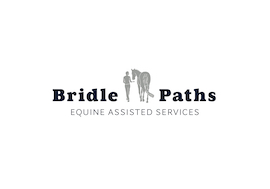
EIN: 46-1402120
Founded: 2012

2023
|
View our WEBSITE
View our EQUINE WELFARE NETWORK PROFILE
View our PHOTO GALLERY
1393/2056/435

